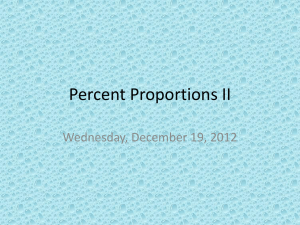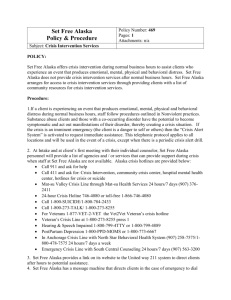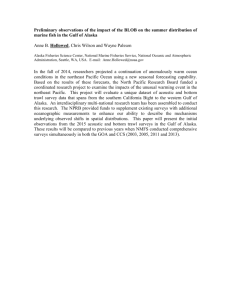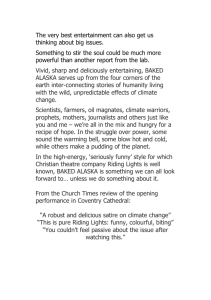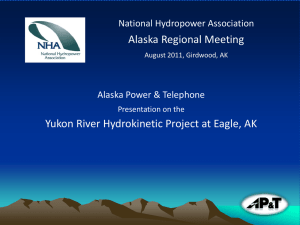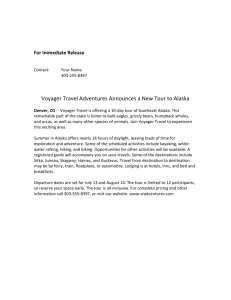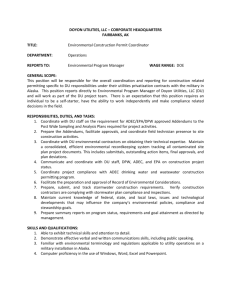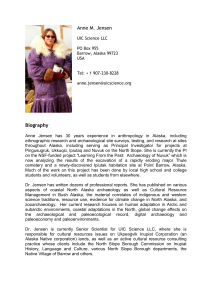Nancy L - Scenarios Network for Alaska + Arctic Planning
advertisement
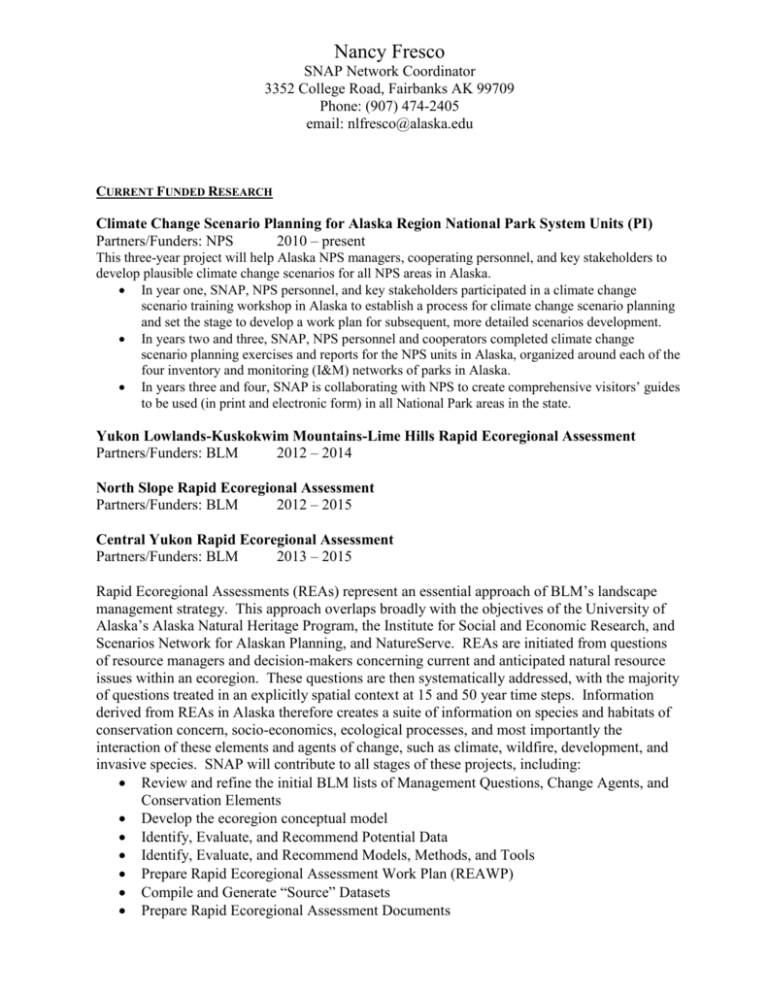
Nancy Fresco SNAP Network Coordinator 3352 College Road, Fairbanks AK 99709 Phone: (907) 474-2405 email: nlfresco@alaska.edu CURRENT FUNDED RESEARCH Climate Change Scenario Planning for Alaska Region National Park System Units (PI) Partners/Funders: NPS 2010 – present This three-year project will help Alaska NPS managers, cooperating personnel, and key stakeholders to develop plausible climate change scenarios for all NPS areas in Alaska. In year one, SNAP, NPS personnel, and key stakeholders participated in a climate change scenario training workshop in Alaska to establish a process for climate change scenario planning and set the stage to develop a work plan for subsequent, more detailed scenarios development. In years two and three, SNAP, NPS personnel and cooperators completed climate change scenario planning exercises and reports for the NPS units in Alaska, organized around each of the four inventory and monitoring (I&M) networks of parks in Alaska. In years three and four, SNAP is collaborating with NPS to create comprehensive visitors’ guides to be used (in print and electronic form) in all National Park areas in the state. Yukon Lowlands-Kuskokwim Mountains-Lime Hills Rapid Ecoregional Assessment Partners/Funders: BLM 2012 – 2014 North Slope Rapid Ecoregional Assessment Partners/Funders: BLM 2012 – 2015 Central Yukon Rapid Ecoregional Assessment Partners/Funders: BLM 2013 – 2015 Rapid Ecoregional Assessments (REAs) represent an essential approach of BLM’s landscape management strategy. This approach overlaps broadly with the objectives of the University of Alaska’s Alaska Natural Heritage Program, the Institute for Social and Economic Research, and Scenarios Network for Alaskan Planning, and NatureServe. REAs are initiated from questions of resource managers and decision-makers concerning current and anticipated natural resource issues within an ecoregion. These questions are then systematically addressed, with the majority of questions treated in an explicitly spatial context at 15 and 50 year time steps. Information derived from REAs in Alaska therefore creates a suite of information on species and habitats of conservation concern, socio-economics, ecological processes, and most importantly the interaction of these elements and agents of change, such as climate, wildfire, development, and invasive species. SNAP will contribute to all stages of these projects, including: Review and refine the initial BLM lists of Management Questions, Change Agents, and Conservation Elements Develop the ecoregion conceptual model Identify, Evaluate, and Recommend Potential Data Identify, Evaluate, and Recommend Models, Methods, and Tools Prepare Rapid Ecoregional Assessment Work Plan (REAWP) Compile and Generate “Source” Datasets Prepare Rapid Ecoregional Assessment Documents SELECTED RECENTLY COMPLETED FUNDED RESEARCH Predicting Potential Future Biomes for Alaska (PI) Partners: USFWS; Dr. Falk Huettmann, UAF IAB Funder: USFWS March 2010 – September 2011 This project’s objectives included: developing climate and vegetation based biomes for Alaska using SNAP climate data and other historical climate data, AVHRR data or other landcover classes for Alaska and Canada, and cluster analysis methodology. using the biomes developed above to identify areas within Alaska that are least likely to change and those most likely to change over the next 100 years, based on SNAP’s 2km down-scaled climate models for Alaska, all 12 months of climate data, and multiple climate scenarios to predict future distributions. Canadian Biome Shift Analysis (PI) Funders: The Nature Conservancy, Ducks Unlimited Canada, Gov’t Canada, Gov’t NWT Partners: TNC, DUC, Gov’t CA, Gov’t NWT, UAF IAB April 2010 -- March 2011 This project was intended to: develop climate and vegetation based biomes for the Yukon and the Northwest Territories, and based on climate data, identify areas within the Yukon and the Northwest Territories that are least likely to change and those that are most likely to change over the next 100 years. The completed biome shift analysis will be used by Ducks Unlimited Canada and other partners involved in protected areas, land use, and sustainable land use planning, which will contribute to waterfowl and wetland conservation in the Yukon and the Northwest Territories. Yukon Climate Projections (PI) November 2009 – November 2010 Funder/Partner: Northern Climate Exchange, Yukon College The goal of this project was to create the following climate projections for the Whitehorse area and the Yukon Territories, based on SNAP data and models: projected change for temperature and precipitation for each of two emissions scenarios (A1B and B1) and two time periods (2030 and 2050), and as time, funding, and data availability allow, additional projections for derived climate variables, including frost-free days, water availability, and growing degree days. SNAP assisted in the interpretation of the above data. Southeast Alaska Hydropower: Reconsidering climate variability and change in the development process (Co-I) Funder: National Marine Fisheries Service Partners: NMFS, IARC, WERC, Hydroelectric plant managers July 2008 – June 2010 The goals of the project were: to assess whether recent precipitation and reservoir inflow anomalies in Southeast Alaska are within the normal range of variability over the observational record, or whether they are evidence of a potential regime shift associated with climate change, and to apply the above assessment to water resource management with respect to Sitka’s Blue Lake and Green Lake projects. The results of this study are intended to be useful to other hydroelectric utilities throughout southeast Alaska. PROFESSIONAL EXPERIENCE Network Coordinator, Scenarios Network for Alaska Planning (SNAP), University of Alaska; 2007-present Coordinated collaborative statewide climate change research and modeling efforts, and communicated model results and adaptation strategies to stakeholders Project Manager, Northern Alaska Environmental Center, Fairbanks AK; 1999-2006 Researched, documented, and presented forest conservation and urban socio-ecological issues in Interior Alaska Internship, Alaska Boreal Forest Council, Fairbanks AK; 2003 Created a comprehensive annotated bibliography: “Functional and Ecological Roles of Stand Age Class Diversity in Boreal Alaska”; researched uses and markets for Alaska birch syrup, a local non-timber forest product Graduate Field Researcher, Mistik Management, Meadow Lake SK, Canada; 1998&1999 Collected and analyzed field data on species composition, tree growth, soil moisture, soil temperature, herbivore browse, and insolation in a multi-tiered boreal forest research project Graduate Research Assistant, New England Carbon Project, Yale University; 1997-1999 Analyzed soil samples for pH, carbon, and nitrogen U.S. Peace Corps Volunteer, Jamaica, Environmental Sector; 1995-1997 Led a locally-based reforestation effort and environmental education effort in a rural agricultural region PUBLICATIONS 2012 Jonathan R. Thompson, Arnim Wiek , Frederick J. Swanson, Stephen R. Carpenter, Nancy Fresco, Teresa Hollingsworth, Thomas A. Spies, David R. Foster. Scenario studies as a synthetic and integrative research activity for long term ecological research. BioSci.62 (4): 367-376. 2011 Jane M. Wolken, Teresa N. Hollingsworth, T. Scott Rupp, Sarah F. Trainor, Tara M. Barrett, Eric A. Beever, F. Stuart Chapin, III, Jeff S. Conn, Lisa K. Crone, David V. D’Amore, Eugenie S. Euskirchen, Nancy Fresco, Thomas, A. Hanley, Paul E. Hennon, Knut Kielland, James J. Kruse, A. David McGuire, Trista Patterson, Edward A.G. Schuur, Paddy Sullivan, David L. Verbyla, John Yarie. Evidence and implications of recent and projected climate change in Alaska’s forest ecosystems. Ecosphere 11:124. 2010 Gary P. Kofinas1, F. Stuart Chapin, III, Shauna BurnSilver, Jennifer I. Schmidt, Nancy L. Fresco, Knut Kielland, Stephanie Martin, Anna Springsteen, and T. Scott Rupp. Resilience of Athabascan subsistence systems to Interior Alaska’s changing climate. Canadian Journal of Forest Research. 40: 1347–1359. 2009 Nancy Fresco and F. Stuart Chapin III. Assessing the Potential for Conversion to Biomass Fuels in Interior Alaska. Pacific Northwest Research Station. Research Paper. PNW-RP-579. Portland, OR: U.S. Department of Agriculture, Forest Service, 56 p. 2009 Sarah F. Trainor, Monika Calef, David Natcher, F. Stuart Chapin III, A. David McGuire, Orville Huntington, Paul Duffy, T. Scott Rupp, La’Ona DeWilde, Mary Kwart, Nancy Fresco Amy Lauren Lovecraft. Vulnerability and adaptation to climate-related fire impacts in rural and urban interior Alaska. Polar Research. Vol 28, No. 1, pp. 100-118. 2007 F. Stuart Chapin III, Kjell Danell, Thomas Elmqvist, Carl Folke and Nancy Fresco. Managing Climate Change Impacts to Enhance Resilience and Sustainability of Fennoscandian Forests. Ambio. Vol. 6, No. 7, pp. 528-533. 2006 F. Stuart Chapin, III, Martin Robards, Henry P. Huntington, Jill F. Johnstone, Sarah F. Trainor, Gary P. Kofinas, Roger W. Ruess, Nancy Fresco, David C. Natcher, and Rosamond L. Naylor. Directional Changes in Ecological Communities and Social-Ecological Systems: A Framework for Prediction Based on Alaskan Examples. American Naturalist. 2004 Bruce C. Forbes, Nancy Fresco, Anatoly Shvidenko, Kjell Danell and F. Stuart Chapin, III. Geographic Variations in Anthropogenic Drivers that Influence the Vulnerability and Resilience of Social-Ecological Systems. Ambio 3(6): 377-382 2004 F.S. Chapin, III, G. Peterson, F. Berkes, T. V. Callaghan, P. Angelstam, M. Apps, C. Beier, Y. Bergeron, A.-S. Crépin, K. Danell, T. Elmqvist, C. Folke, B. Forbes, N. Fresco, G. Juday, J. Niemelä, A. Shvidenko, and G. Whiteman. Resilience and Vulnerability of Northern Regions to Social and Environmental Change. Ambio 3(6): 344–349. 2003 F. Stuart Chapin, III, T. Scott Rupp, Anthony M. Starfield, La-ona DeWilde, Erika S. Zavaleta, Nancy Fresco, Jonathon Henkelman, and A. David McGuire. Planning for resilience: modeling change in human-fire interactions in the Alaskan boreal forest. Frontiers in Ecology and the Environment 1(5): 255-261. EDUCATION University of Alaska, Fairbanks PhD, Integrated Graduate Education and Research Training Program in Regional Resilience and Adaptation; Department of Biology and Wildlife; 2006 Co-advisors: Dr. F. Stuart Chapin III, Professor of Ecology, American Academy of Arts and Sciences, National Academy of Sciences Dr. A. David McGuire, Professor of Ecology Dissertation: “Carbon Sequestration in Alaska's Boreal Forest: planning for resilience in a changing landscape” Yale University, School of Forestry and Environmental Studies, New Haven CT Master of Environmental Studies, Conservation Biology; 1999 Harvard University, Cambridge MA BA, Biological Anthropology, magna cum laude; 1994 TEACHING EXPERIENCE Committee Member, Corrie Knapp (PhD), 2010-present; Senior Thesis Advisor, Ellen Hatch, 2009-2010 Instructor, School of Natural Resources and Agricultural Sciences, UAF, Natural Resources Measurement and Inventory, 2007-2009 Teaching Assistant, Biology and Wildlife Department, UAF, Population Ecology; 2004 Teaching Assistant, Biology and Wildlife Department, UAF, Evolution; 2003 Teaching Assistant – Writing Intensive, Biology Department, Yale University, Introduction to Environmental Studies; 1999 Teaching Assistant, Biology Department, Yale University, Global Problems of Population Growth; 1998
